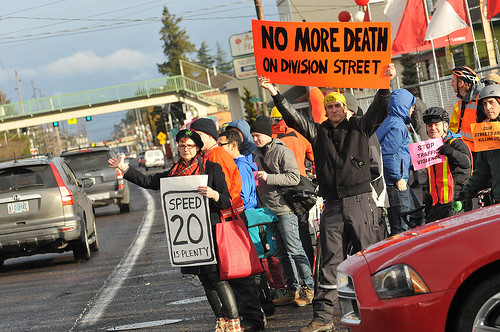People who use a busy section of Willamette Boulevard in North Portland will be safer by the end of this month (if all goes according to plan). It’s an improvement we waited seven years for and it happened in just a few days, all thanks to smart and quick action by handful of volunteers who care deeply about the safety of our streets.
The astounding speed of the progress we just witnessed on Willamette is just the latest in a string of successes that can be tied directly to the actions of Portland’s considerable army of unpaid transportation reform activists.
The lineage of this DIY activism is a proud tradition in Portland and goes back far beyond my time on this beat; but it seems to be gaining steam of late due to a variety of factors — all of which were present on the Willamette Blvd effort.
Friends of Willamette Blvd effectively leveraged insider knowledge of both transportation and local politics, then mixed it with savvy use of the internet and social media to create a wave of support for their idea. Then they made sure that wave splashed directly on City Commissioner Dan Saltzman (he’s in charge of the Portland Bureau of Transportation). With the right tone and timing, this Friends group got exactly what they asked for.
Off the top of my head I can think of several other similar groups that have sprung up in the relatively recent past: We Are All Traffic, Active Right of Way, PDX Transformation, Bike Loud PDX, Better Block PDX, Portland Bus Lane Project, No More Freeways, and I know there are others I’m leaving out. Add to all these a myriad of neighborhood associations and slightly more formal, but still volunteer groups — and the nascent traffic safety group forming in north Portland as I type this (yes!) — and you begin to see a formidable flank in the battle for safe streets. They’re like the Army’s Active Guard Reserve, ready to spring into action on a moment’s notice.
These reserve troops are more capable and more important in Portland today than they’ve ever been for three main reasons.
Advertisement
The first one is the most obvious: The organizing and publishing power of social media has fundamentally changed the game for citizen activists in the past five years or so. It’s hard to imagine now, but when BikePortland started in 2005 Facebook was only a college thing (their News Feed didn’t even launch until 2006). Back then there was no central and highly-visibile place where Portlanders could publish thoughts about everyday bicycling issues. As individual and group social networks have strengthened exponentially in recent years, so too has people’s skill in using them. Mature social networks used by sophisticated users = impact. This new, new era of publishing (people used to think this blog was high-tech!) gives people an amazingly powerful outlet for activism. Combine these individual and group networks with the amplifying force of a well-established blog, and you can reach and influence a lot of people in a short amount of time.
The second reason citizen activism is thriving in Portland is related to the first one: the democratization of information. City and political staffers often lament that “everyone thinks they’re an expert.” Well, hate to break it to you, but these days, everyone sort of is an expert. Or at least, people are a lot smarter than many bureacrats, politicians, and media people give them credit for. Portland’s transportation reformers have a trove of data, reporting, studies, and other information right at their fingertips. And they’re not afraid to use it — and then share it with friends.
One of the founding principles of BikePortland is that smart citizens cannot be messed with by those in power. Armed with knowledge about the policies, people, and projects that shape this city, citizen activists can hit the ground running and make an impact quickly.
The last reason we’re seeing more of — and more impact from — these citizen groups, is because Portlanders are increasingly aware that no one else will do this work for them.
Portland has already gone from bad to good, transportation-wise. We were one of the first in the U.S. to do that and we’ve been patting ourselves on the back about it for decades. But the new era demands we go from good to great. And that has proven much more difficult. PBOT’s planning and project timelines are agonizingly long and people want to speed things up a bit — whether that means working within the system or going outside of it. The other factor is that the professional advocacy groups, like The Street Trust, have shown little interest in working on many of the smaller, local issues and projects that need attention. The lack of local engagement from The Street Trust is what inspired Bike Loud PDX, the group whose impressive work led to a major shift in how PBOT implements neighborhood greenways (among other things). The Street Trust has opted instead to focus on regional and statewide funding, lobbying and legislation, and their programmatic work like Safe Routes to School. That’s important stuff for sure, but they’ve left a ton of work on the table.
We’re all lucky there are so many smart and engaged Portlanders willing to pick that work up and move it forward.
So, what’s the next project we should do? What streets need our attention? Who wants to work together? Let’s go.
— Jonathan Maus: (503) 706-8804, @jonathan_maus on Twitter and jonathan@bikeportland.org
Never miss a story. Sign-up for the daily BP Headlines email.
BikePortland needs your support.



